上海新世纪版高一年级第二学期-Unit 5 Music 知识点学案
文档属性
| 名称 | 上海新世纪版高一年级第二学期-Unit 5 Music 知识点学案 |
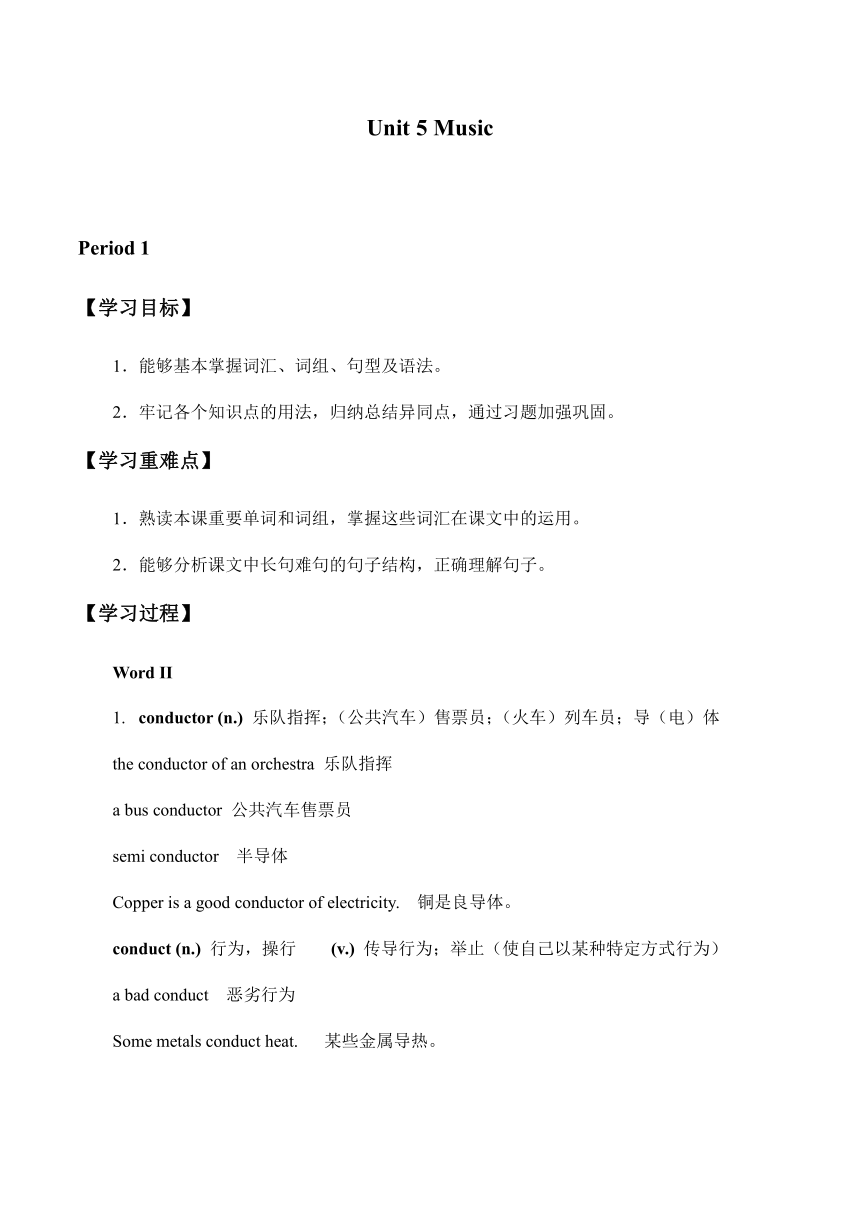
|
|
| 格式 | zip | ||
| 文件大小 | 51.5KB | ||
| 资源类型 | 教案 | ||
| 版本资源 | 上海新世纪版 | ||
| 科目 | 英语 | ||
| 更新时间 | 2020-02-24 00:00:00 | ||
图片预览

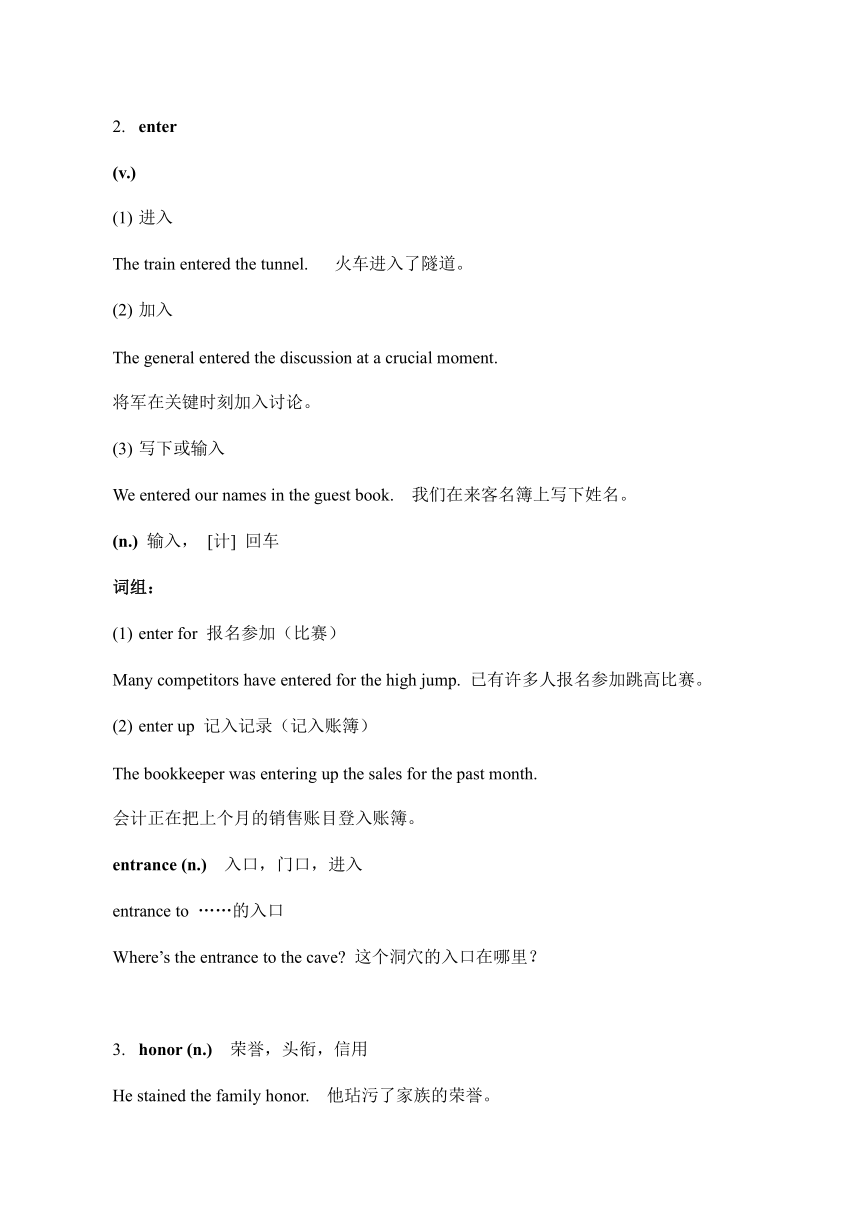
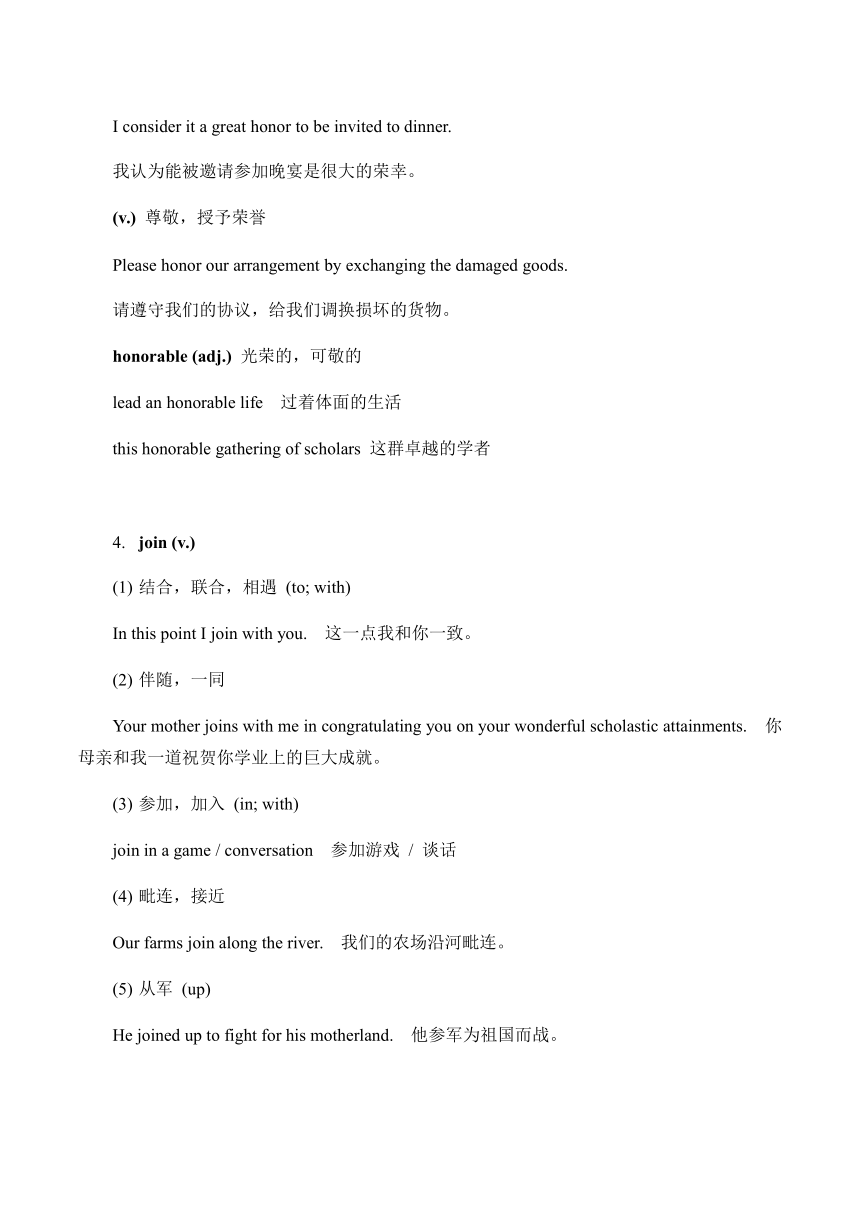
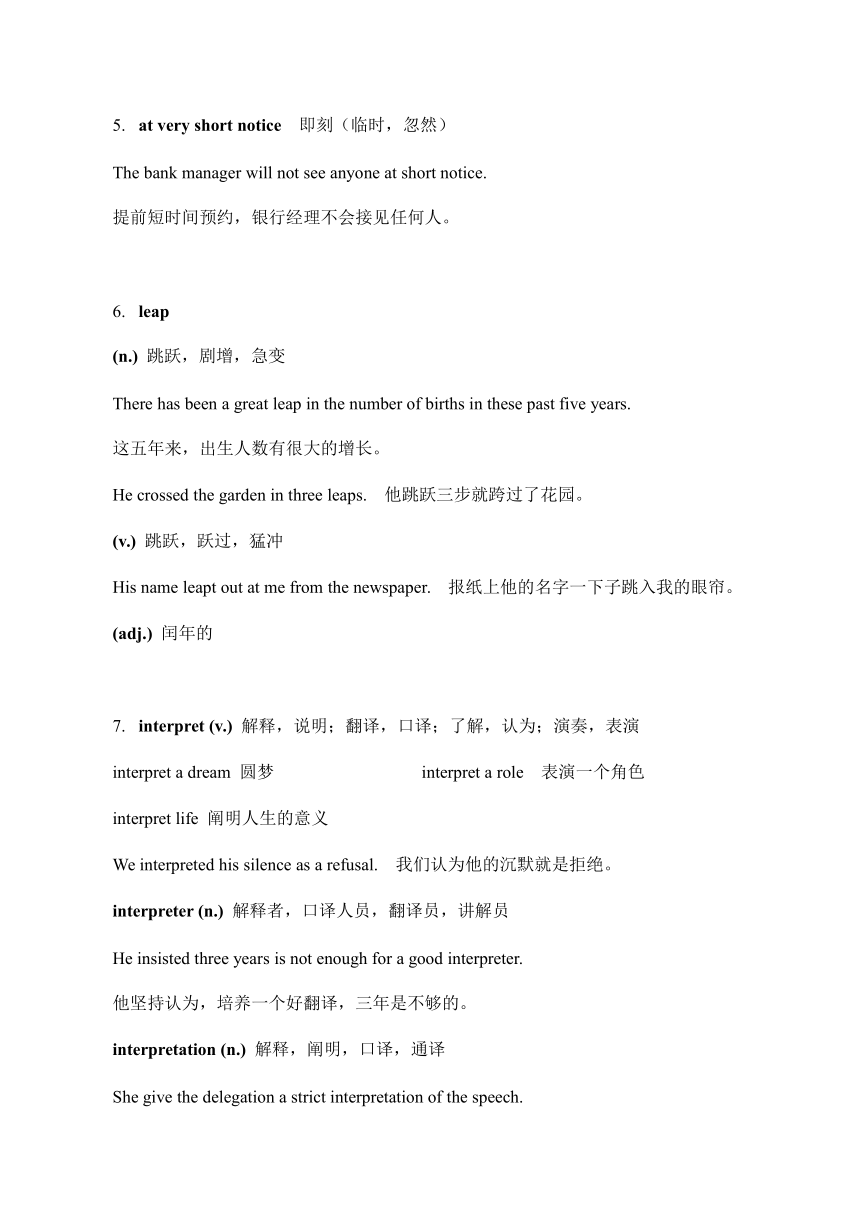
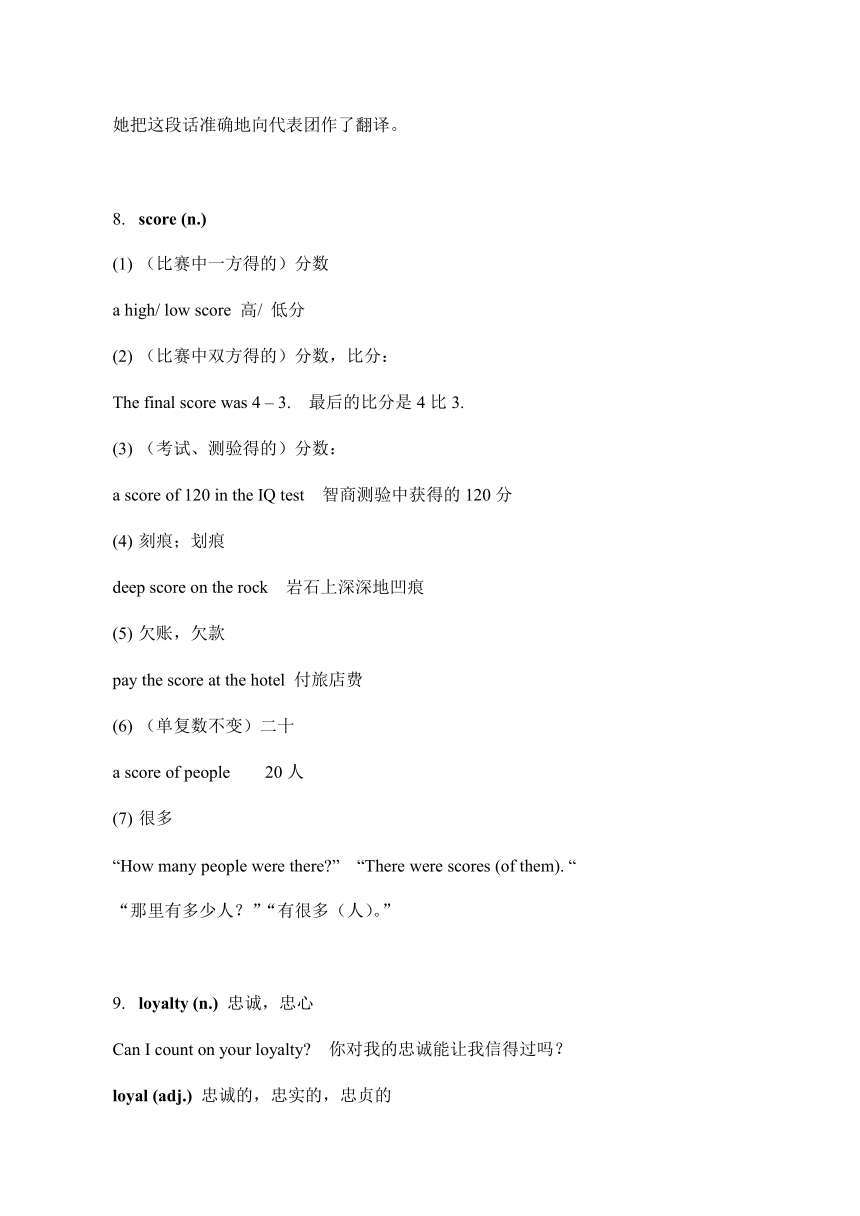
文档简介
Unit 5 Music
Period 1
【学习目标】
1.能够基本掌握词汇、词组、句型及语法。
2.牢记各个知识点的用法,归纳总结异同点,通过习题加强巩固。
【学习重难点】
1.熟读本课重要单词和词组,掌握这些词汇在课文中的运用。
2.能够分析课文中长句难句的句子结构,正确理解句子。
【学习过程】
Word II
1. conductor (n.) 乐队指挥;(公共汽车)售票员;(火车)列车员;导(电)体
the conductor of an orchestra 乐队指挥
a bus conductor 公共汽车售票员
semi conductor 半导体
Copper is a good conductor of electricity. 铜是良导体。
conduct (n.) 行为,操行 (v.) 传导行为;举止(使自己以某种特定方式行为)
a bad conduct 恶劣行为
Some metals conduct heat. 某些金属导热。
2. enter
(v.)
(1) 进入
The train entered the tunnel. 火车进入了隧道。
(2) 加入
The general entered the discussion at a crucial moment.
将军在关键时刻加入讨论。
(3) 写下或输入
We entered our names in the guest book. 我们在来客名簿上写下姓名。
(n.) 输入, [计] 回车
词组:
(1) enter for 报名参加(比赛)
Many competitors have entered for the high jump. 已有许多人报名参加跳高比赛。
(2) enter up 记入记录(记入账簿)
The bookkeeper was entering up the sales for the past month.
会计正在把上个月的销售账目登入账簿。
entrance (n.) 入口,门口,进入
entrance to ……的入口
Where’s the entrance to the cave? 这个洞穴的入口在哪里?
3. honor (n.) 荣誉,头衔,信用
He stained the family honor. 他玷污了家族的荣誉。
I consider it a great honor to be invited to dinner.
我认为能被邀请参加晚宴是很大的荣幸。
(v.) 尊敬,授予荣誉
Please honor our arrangement by exchanging the damaged goods.
请遵守我们的协议,给我们调换损坏的货物。
honorable (adj.) 光荣的,可敬的
lead an honorable life 过着体面的生活
this honorable gathering of scholars 这群卓越的学者
4. join (v.)
(1) 结合,联合,相遇 (to; with)
In this point I join with you. 这一点我和你一致。
(2) 伴随,一同
Your mother joins with me in congratulating you on your wonderful scholastic attainments. 你母亲和我一道祝贺你学业上的巨大成就。
(3) 参加,加入 (in; with)
join in a game / conversation 参加游戏 / 谈话
(4) 毗连,接近
Our farms join along the river. 我们的农场沿河毗连。
(5) 从军 (up)
He joined up to fight for his motherland. 他参军为祖国而战。
5. at very short notice 即刻(临时,忽然)
The bank manager will not see anyone at short notice.
提前短时间预约,银行经理不会接见任何人。
6. leap
(n.) 跳跃,剧增,急变
There has been a great leap in the number of births in these past five years.
这五年来,出生人数有很大的增长。
He crossed the garden in three leaps. 他跳跃三步就跨过了花园。
(v.) 跳跃,跃过,猛冲
His name leapt out at me from the newspaper. 报纸上他的名字一下子跳入我的眼帘。
(adj.) 闰年的
7. interpret (v.) 解释,说明;翻译,口译;了解,认为;演奏,表演
interpret a dream 圆梦 interpret a role 表演一个角色
interpret life 阐明人生的意义
We interpreted his silence as a refusal. 我们认为他的沉默就是拒绝。
interpreter (n.) 解释者,口译人员,翻译员,讲解员
He insisted three years is not enough for a good interpreter.
他坚持认为,培养一个好翻译,三年是不够的。
interpretation (n.) 解释,阐明,口译,通译
She give the delegation a strict interpretation of the speech.
她把这段话准确地向代表团作了翻译。
8. score (n.)
(1) (比赛中一方得的)分数
a high/ low score 高/ 低分
(2) (比赛中双方得的)分数,比分:
The final score was 4 – 3. 最后的比分是4比3.
(3) (考试、测验得的)分数:
a score of 120 in the IQ test 智商测验中获得的120分
(4) 刻痕;划痕
deep score on the rock 岩石上深深地凹痕
(5) 欠账,欠款
pay the score at the hotel 付旅店费
(6) (单复数不变)二十
a score of people 20人
(7) 很多
“How many people were there?” “There were scores (of them). “
“那里有多少人?”“有很多(人)。”
9. loyalty (n.) 忠诚,忠心
Can I count on your loyalty? 你对我的忠诚能让我信得过吗?
loyal (adj.) 忠诚的,忠实的,忠贞的
a loyal wife 忠贞的妻子
loyally (adv.) 忠诚地
Unit 5 Music
Period 2
【学习目标】
1.能够基本掌握词汇、词组、句型及语法。
2.牢记各个知识点的用法,归纳总结异同点,通过习题加强巩固。
【学习重难点】
1.熟读本课重要单词和词组,掌握这些词汇在课文中的运用。
2.能够分析课文中长句难句的句子结构,正确理解句子。
【学习过程】
Word II
10. stamp
(v.)
(1) 重重地踩在(地面等)上;跺;踏平,踩扁(某物):
He stamped (his foot) in anger. 他气得直跺脚。
(2) 在(纸等)的上面盖图案、公章等
They didn’t stamp my passport. 我的护照上没盖章。
The librarian forgot to stamp my library books.
图书管理员忘了在我借的书上盖日期了。
(n.)
(1) 邮票;印花
collecting stamps as a hobby 集邮 stamp album 集邮簿
(2) 印章,图案
a rubber stamp 橡皮图章 stamp duty 印花税
(3) 印记;戳记
Have you got any stamps in your passport? 你的护照盖印了吗?
(4) 种类;类型
men of a different stamp 另一类的人
11. snap
(v.)
(1) 突然折断
snap a stick in two 将棒折成两段
(2) 使噼啪地响
snap down the lid of a box 啪嗒一声关上箱盖
(3) 厉声说,急促地说 (out)
snap out his order 急促地发布他的命令
snap sb. a sharp reply 怒气冲冲地用话把某人顶回去
(4) 抢夺,争购 (up)
The cheapest goods were soon snapped up. 最便宜的货物很快被抢购一空。
(n.)
(1) (天气的) 急变 (特指骤冷)
cold snap [美] 短时间的突然降温,寒汛
(2) [口] 精力,气力
There is no snap left in him. 他一点精力都没有了。
in a snap 立刻,马上
12. tear
(n.) 通常作复数,泪;泪水;泪珠
A tear rolled down his cheek. 一滴泪珠沿着他的面颊流下来。
The memory of his dead mother brought tears to his eyes.
他忆起去世的母亲便热泪盈眶。
a story that moved/ reduced us to tears. 使我们感动得落泪的故事
shed/ weep bitter tears 流出痛苦的泪水 burst into tears 哭了起来
tearful 哭泣的;要哭的
tear-drop 泪珠
tear-gas 催泪瓦斯
(v.)
(1) 将(某物)撕开、扯下或撕碎
He tore his shirt on a nail. 他的衬衣让钉子刮破了。
(2) 强行使某人离开某人/ 某物;夺去;揪走
The child was torn from its mother’s arms. 把孩子从母亲怀抱中夺走了。
(3) (尤用于被动语态)破坏(某物的)安宁;扰乱
Her heart was torn by grief. 她肝肠寸断。
(4) 习语,彻底毁灭或击败某事物;严厉地批评某事物
tore his hopes to shreds 使他的希望彻底破灭
The critics tore her new play to pieces. 剧评家们将她的新戏批评得一无是处。
13. float (v.)
(1) 漂浮;漂流;飘动
A balloon floated across the sky. 有个气球从空中飘过。
(2) 提出(计划、方案等);交出(以供取舍)
Let me float a couple of ideas. 让我来谈两三点意见以供参考。
(3) (尤用于进行时态)(指传闻)广为流传
There’s a rumor floating around of a new job in the unit.
这个部门盛传有个新工作要聘人。
(4) [口] (指人)游荡,无所事事
My weekend was boring I just floated about (the house) or watched TV.
我的周末过得很无聊,只是在屋子里转转或者看看电视。
floating (adj.) 漂浮的,浮动的,移动的,流动的,不固定的
the floating population 流动人口 floating capital 游资,流动资本
float (n.) 漂流物,浮舟,漂浮,浮萍,彩车
The club display was mounted on a huge float and paraded through the main street.
俱乐部的展品装在大型花车上在大街上通过。
14. weep (v.) 流泪,哭泣;(尤指伤口)流出或渗出液体(尤指脓)
weep for joy 喜极而泣
The sight made me want to weep. 我见到这种情形真想痛哭一场。
(n.) 一阵哭泣
A good weep would probably make you feel better.
你痛痛快快哭上一阵也许就好受些了。
weeping (adj.) [作定语] (指某些树)有下垂枝条的
a weeping birch, willow, etc. 枝条下垂的桦树、垂柳
weepy (adj.) 要哭的;动不动就哭的;含泪的
She is still feeling weepy. 她仍觉得想哭。
15. spare
(v.) 节约
Can you spare me five minutes? 你能抽出5分钟和我谈谈吗?
It’s a horrible story – I’ll spare you the details. 这是一次令人毛骨悚然的事故,我就不告诉你细节了。
(adj.) 多余的,备用的,简陋的
a spare ticket 退票 spare time 空闲时间
spare part 备用件 spare channel 备用线路
spare hand 替班工人 spare oil 备用油
a spare tire 预备轮胎;[美俚] 讨厌的人 a spare meal 不丰盛的饭菜
a spare person 瘦人
Unit 5 Music
Period 3
【学习目标】
1.能够基本掌握词汇、词组、句型及语法。
2.牢记各个知识点的用法,归纳总结异同点,通过习题加强巩固。
【学习重难点】
1.熟读本课重要单词和词组,掌握这些词汇在课文中的运用。
2.能够分析课文中长句难句的句子结构,正确理解句子。
【学习过程】
Word III
16. slap (n.) 掴,侮辱,拍击声 (v.) 拍击,侮辱,申斥
He slapped me on the back on my way home. 在我回家的路上,他在我背上拍了一下。
His decision was a slap in the face to those who had tried to change his mind.
他的决定对于那些试图要说服他的人不啻是一记耳光。
She tried to object, but the chairman slapped her down.
她想表示反对意见,但主席喝止住了她。
17. anti
anti- 和counter- 都有“反……”之意。 anti- 指反对的态度
anti-war literature 反战文学 the anti-nuclear campaign 反核子运动
counter- 指为防止某事物或针对某事物而采取的行动
counter-revolution 反革命
18. attack
(v.)
(1) 攻击;进攻;袭击
They decided to attack at night. 他们决定夜晚进攻。
(2) 抨击
a newspaper article attacking the Prime Minister 报纸上抨击首相的文章
(3) 奋力着手处理(某事物);对付
Shall we attack the washing-up? 咱们动手洗碗碟好吗?
(4) 侵袭,腐蚀(某事物 / 某人)
a disease that attacks the brain 侵袭大脑的疾病
(n.) 空袭;攻击;进攻;(疾病等突然的)侵袭,发作
Many civilians were killed in the air raids on London. 在伦敦遭空袭时,有很多老百姓遇难。
a heart attack 心脏病发作
19. protest
(v.)
(1) 抗议,反对(某事物);对(某事物)提出异议
She protested strongly at being called a snob. 她极力反对别人说她势利眼。
(2) 严正地或坚决地申明(某事物);声辩
He protested his innocence. 他坚决声辩自己无罪。
She protested that she had never seen the accused man before.
她坚持说她以前从未见过这一被指控的男子。
(n.) 抗议;抗议书;抗议活动
Loud protests were heard when the decision was announced.
这决定一经宣布,抗议之声不绝于耳。
protestor (n.) 抗议者;反对者
protestation (严正的) 声明
Despite their protestations, they were glad to accept our help.
尽管他们严肃地表明了态度,但他们仍乐于接受我们的援助。
20. interview (n.) 面谈,访问,接见 (v.) 接见,会谈
He mentioned that problem at our interviews. 他在我们会谈时提到了那个问题。
All the applicants were interviewed one by one. 所有的申请者一个接着一个参加面试。
The two rival politicians came/ were brought face to face in a TV interview.
那两个对立的政客面对面地一起接受电视访问。
21. manner (n.)
(1) 方式;方法
I don’t object to what she says, but I strongly disapprove of her manner of saying it. 我不反对她说的话,但她说这话的方式我很反感。
(2) 态度
He has an aggressive manner. 他的态度咄咄逼人。
(3) manners [pl] 礼貌;规矩
good/ bad manners 有 / 没有礼貌
It’s bad manners to stare at people. 瞪着眼睛看人是不礼貌的。
(4) 习惯,风俗
eighteenth-century aristocratic manners 18世纪贵族的风俗习惯
(5) not by any manner of means/ by no manner of means (用以加强语气): not at all 一点也不;绝不
She hasn’t won yet, (not) by any manner of means. 她还未获胜,远未获胜。
mannered (adj.) (语言、文字等)不自然的,矫揉造作的
Her prose is far too mannered and self-conscious. 她的散文过于矫揉造作。
22. slip (n.) 滑,错误,下跌 (v.) 滑倒,犯错,减退
The soap slipped out of my hand. 肥皂从我手上滑落了。
You’re not going to let a wonderful chance like that slip through your fingers, are you?
你不会错过那样的好机会,对吗?
23. career-oriented 事业心很强
用作形容词的 “…-oriented” 意思有很多,表示“以……为目的”、“对……感兴趣”、“重视……”,可以作表语,也可以作定语,而oriented本身除了可以用名词修饰,也可以用副词修饰(不用加连词符),翻译时则要根据上下文选用合适的词语。
a music-oriented youth 一个对音乐情有独钟的年轻人
a therapy-oriented medical establishment 一所着重治疗的医学机构
export-oriented industries 外向型工业(以出口为主)
24. awake, wake, awaken, waken的用法
(1) wake和awake的过去式和过去分词可以是规则的 (waked, waked和awaked, awaked), 也可以是不规则的 (woke, woken和awoke, awoken), 但在现代英语中通常只用其不规则变换形式
(2) 从理论上说,这四个动词都可用作及物和不及物动词;但从实际使用上看,wake和awake多用作不及物动词,而waken和awaken多用作及物动词。
(3) wake, waken通常可与up连用,而awake和awaken则一般不与up连用。
(4) awake和awaken尽管可以用于本义表示“醒来”或“弄醒”,但更多是用于比喻义表示“认识到”、“意识到”等;wake (up) 通常用于本义,也可用于比喻义;但waken则主要用于本义,一般不用于比喻义。
(5) awake除用作动词外,还可用作形容词(只用作表语,意为“醒着的”、“意识到”),而其余三个词通常用作动词,不能用作形容词。
He is wide awake. 他还没有一点睡意。
They aren’t awake to the difficulties. 他们没有意识到这些困难。
注意:形容词awake通常用wide,fully等修饰,一般不用very修饰。
(6) 在这四个动词中,wake (up) 是最普通也是最不正式的一个词。如果只考虑其正确性而不考虑其普通性,有时一个意思可能有多种表达:
He woke up (awoke, wakened, wakened up, awakened) when I entered. 当我进来时他醒了。
The sound woke (wakened) him up. / The sound awoke (awakened) him. 这声音把他吵醒了。
They haven’t yet woken up (awoken, awakened) to the seriousness of the situation. 他们还没意识到形势的严重性。
25. approve of 赞成
I entirely approve of that theory. 我完全赞成那种理论。
Her father will never approve of her marriage to you. 她父亲永不会同意她和你结婚。
approval (n.) 批准,认可,同意,赞同
disapproval (n.) 不赞成
